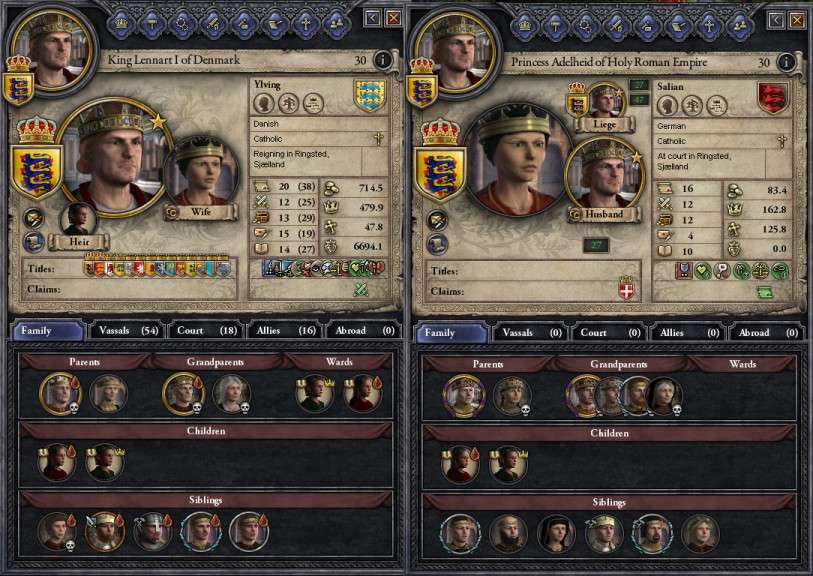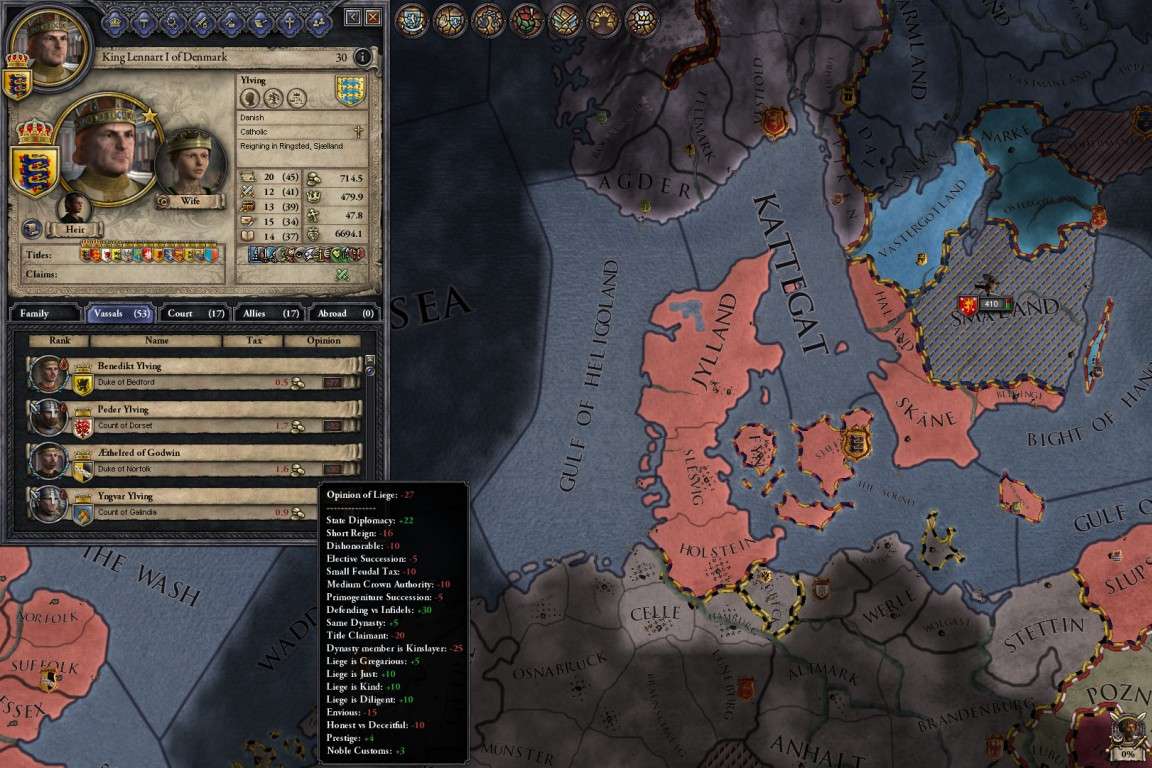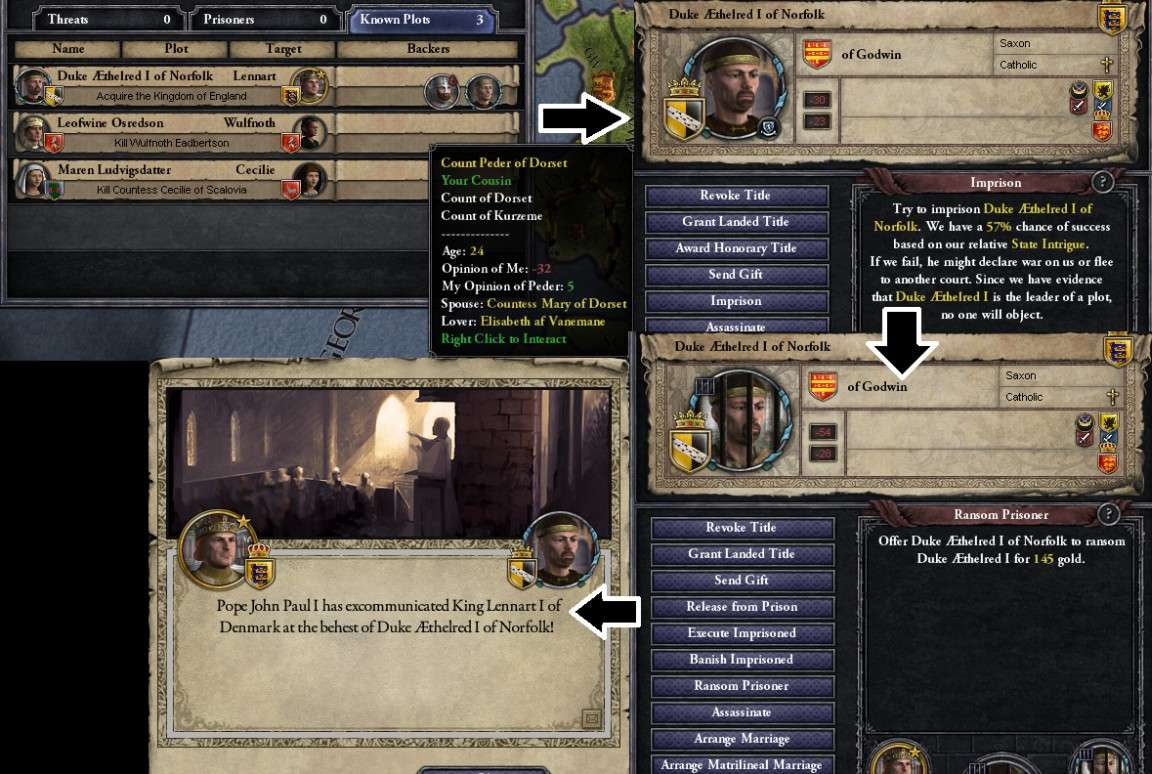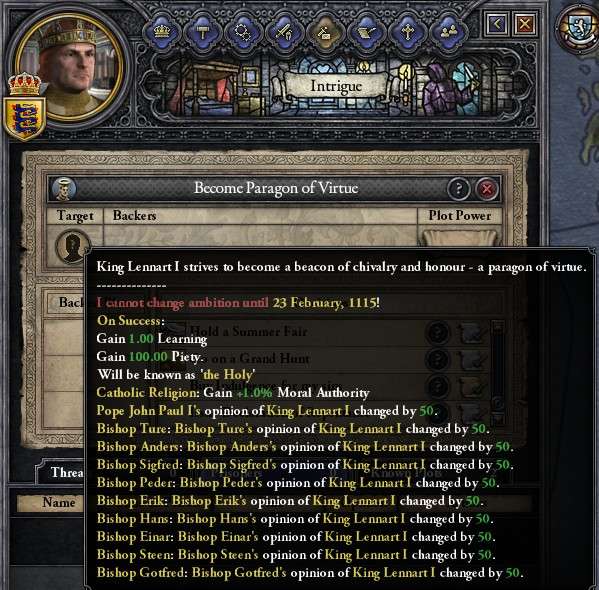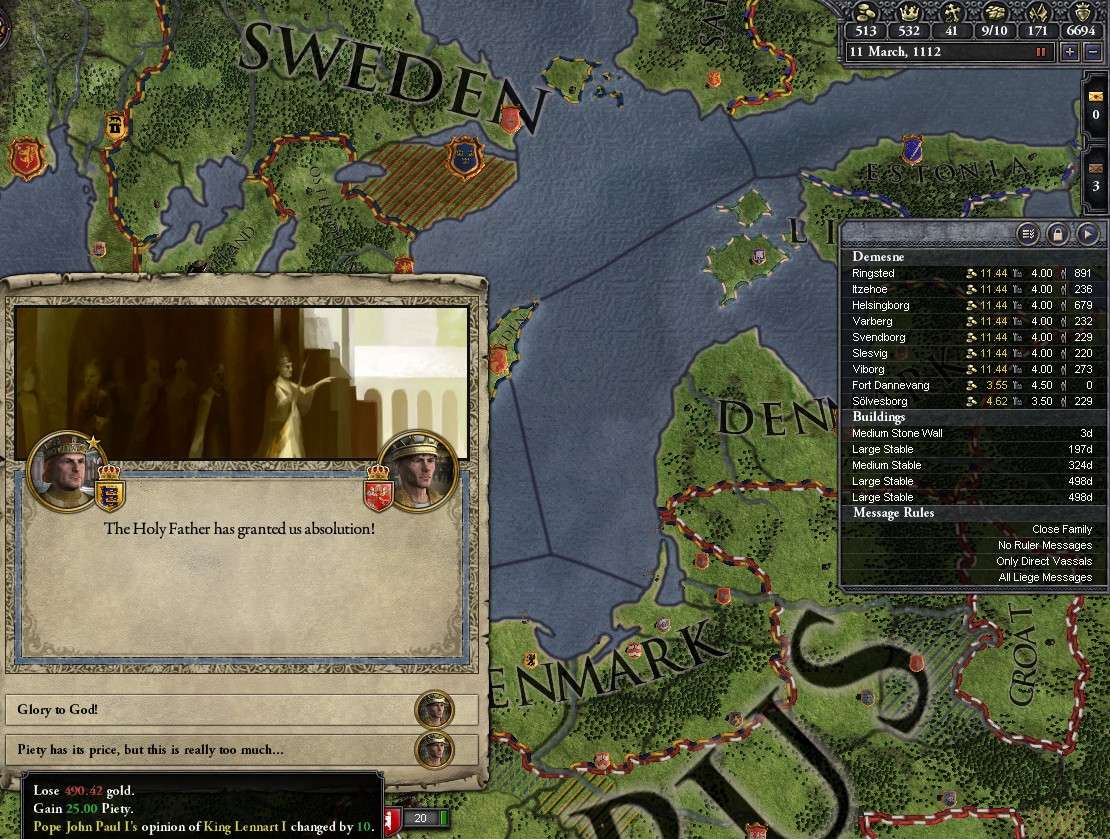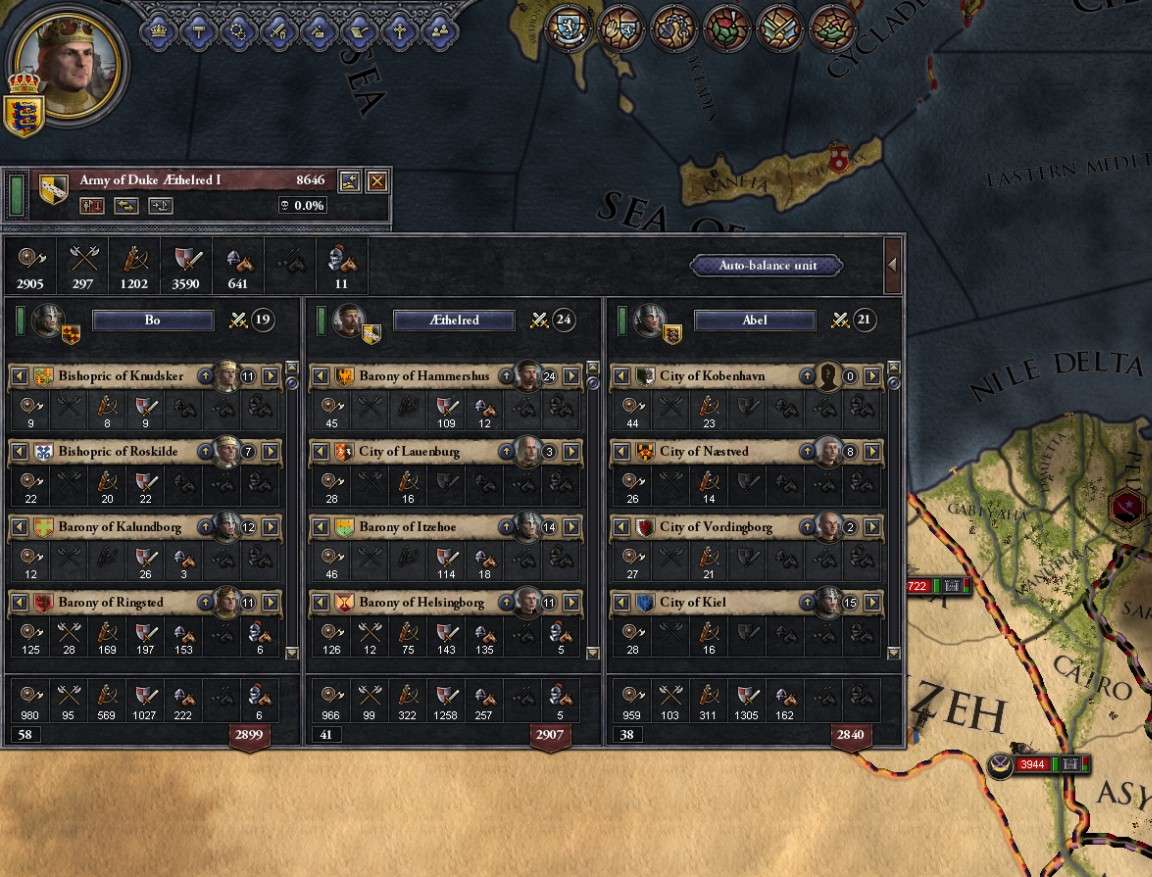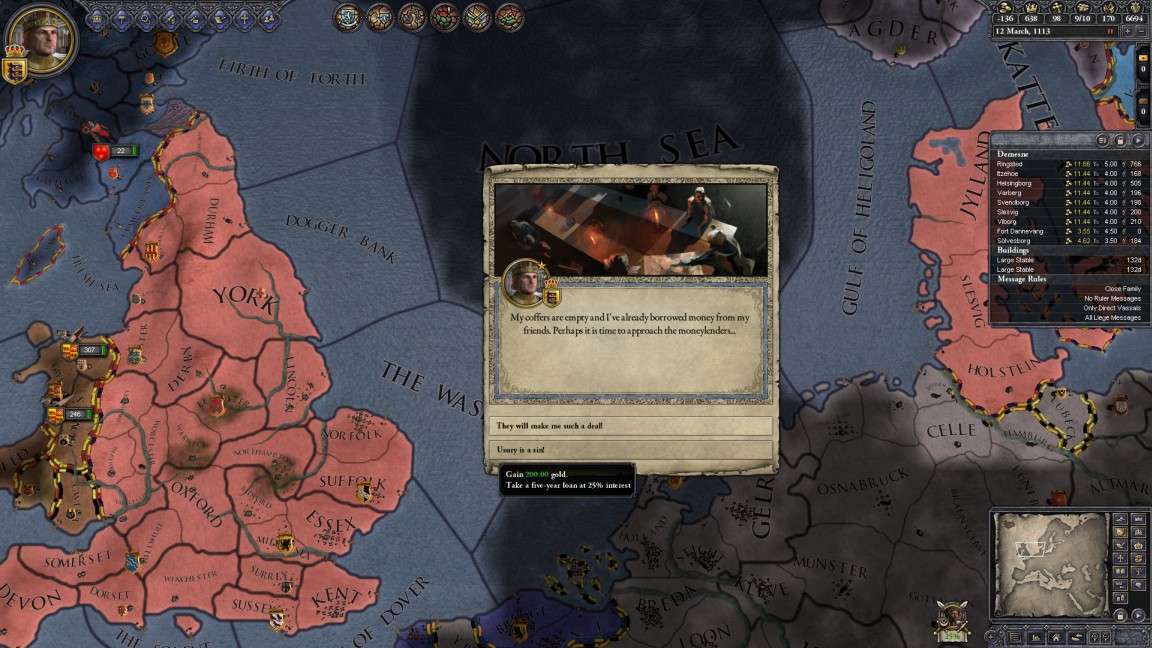Born to Breed: The Estridsen Lectures
Lennart I Kin-slayer
Absence makes the heart grow fonder, ugly mugs and inanity, absurd demands by the dean, a worse fate, primogeniture, a vile man understood, the Vatican archives, conflicted to the core and bad to the bone, hatred and kin-slaying, the practical benefits of holy war, a farce in three parts, an absurd plan, a clash in the desert, of empty coffers, an unexpected occurrence.
Welcome back, class.
I hope you enjoyed my absence, because I surely did. Alas, now I am forced to view your ugly mugs once again, my students, and listen to your occasional inane ramblings, which I am by direct order of the dean forced to consider the uplifting output of a deliberate thought process by the finest minds of your generation, and what fate could be worse than that?
The fate of Lennart I Estridsen, the kin-slayer, that's what, which by funny coincidence brings us to the topic of today's lecture.
As you no doubt recall, king Erik the Merry, first of his name, ruled well and justly for a considerable span of years and was, in the fullness of time, succeeded by his firstborn son, Lennart, his secondborn son, Christian, a much more qualified candidate, having to make do as a bishop in far-off Burgundy, married off to the duchess to introduce a line of Estridsens in France.
A Conflicted King
King Lennart and Queen Adelhaid, 1111
Now, Lennart was king, but if we dig through the curses, slurs, and scandalous propaganda heaped upon his head by his many detractors, what sort of man was he? Recently opened Vatican archives may hold the key to understanding this conflicted man.
King Lennart took the throne in August 1011, and he was already then a man universally despised, from the least of his nobles to his father-in-law, the german emperor himself.
On the face of it, he made an ideal king for times of peace, being highly intelligent and well schooled as a diplomat, of personality just and kind, and of inclination diligent and gregarious. In any other man, his many sterling qualities would have guaranteed a golden reign.
Alas, it was not to be. Apart from his undeniable qualities, king Lennart was deceitful, proud beyond reason, cynical to a fault, and wroth beyond measure; His word could not be trusted, his justice ever carried a barb, his social manners were ever subordinate to his scheming, and his kindness ever lay close to his anger.
It is said that the only people in the world who loved him were his father, now dead, his chaste wife, and his two children, Rikissa (born 1099) and Asger (born 1095).
Be that as it may, his scheming had brought about the death of several cousins during king Erik's twilight years, and the nobility of Denmark, consisting for the most part of his extended family, while barely accepting of such kin-slaying from the king's heir while king Erik reigned with a firm hand, were not inclined to acceptance of such from their king. Indeed, it is safe to say that the invasion of Danish Alexandria by the Caliph following king Erik's death was the best strike of luck possible in the circumstances.
While Denmark remained engaged defending in a holy war with, surely the nobility would stay their hand, thus giving king Lennart time to strengthen his weak grip on the Danish realm!
King Lennart's Unhappy Vassals, 1111
A Farce in Three Acts
Indeed, if king Lennart had stuck to prosecuting the war while slowly but surely strengthening his grip on Denmark, he might have prevailed. His perverse nature, it almost goes without saying, allowed him to do no such thing.
As the Gesta Danorum explains, it is a farce in three acts:
Act the first:
His spymaster informs the king that duke Ætheldred of Norfolk, one of the last saxon dukes, is plotting to acquire the kingdom of England, and count Peder of Dorset is in on the plot.
King Lennart despises the duke and his cousin Peder. Peder despises his cousin the king as a kinslayer and dislikes the duke as a saxon. The Duke dislikes both Peder and Lennart as Danish invaders.
The plot is frivolous and stands no chance of success, the saxon nobility being a spent force, but nevertheless Lennart decides to act to show that he's large and in charge. He orders the imprisonment of Æthelred, hoping that the stubborn duke will resist..
Act the second:
But Æthelred does not resist. On October 18th, 1111, King Lennart imprisons duke Æthelred during the early morning hours, clapping him in irons and throwing him into the dungeons to mull his fate. Denied lunch, the duke suffers the second shock of the day when that very same afternoon he is dragged before the king for a second time, who offers him his freedom for a good quality of gold and no hard feelings.
Act the third:
Shortly after returning home, duke Æthelred sends word to Rome, and the Pope excommunicates king Lennart. Exeunt omnes.
King Lennart: Acts I-III.
Too Smart For His Own Good
So, king Lennart found himself in a bit of a predicament. Not only did his vassals hate him as a kinslayer, the pope hated him and had effectively issued a hunting license on his head. What was a man to do? Especially a man who saw himself as raised above all others by virtue of both birth and skill?
That's right, he decided that the best way to get the pope to remove the excommunication was to become publicly pious in the extreme. Nobody would have considered him a pious man in the past, but that was all water under the bridge, and he'd passed a lot of water since then... which come to think of it makes a most vivid mental image, entirely appropriate to the man who pissed on customs and public mores when he could get away with it.
King Lennart Wants to be a Paragon of Virtue, February 1112
Now, there was a slight problem with king Lennarts desire to become known to the world as a paragon of virtue, apart from the fact of being no such thing, which he considered only a minor hindrance to be overcome, namely that his cynical nature impeded his scheming nature.
He could issue a declaration of repentance and sent plenty of gold to Rome in the hope that the Holy Father would grant him absolution for kin-slaying, but what if the Holy Father said no? He'd have no particular reason to say yes, and every reason to hold out for more money.
No, as the king saw it, to gain a public reputation for piety, the easiest way was to purchase indulgences by the wagon-load, and thus step by step guide the Holy Father down the sliding slope to Lennart's salvation.
First Cartload of Indulgencies, March 1112
An Interlude in the Desert
Meanwhile, the Caliph hadn't been idle. His army had gathered and invaded Alexandria. Preoccupied with matters of intrigue, the Alexandrine garrisons were all that stood in the way of the infidel horde, and they were nowhere near enough.
Caliphal Army Gathers, June 1112
Now, king Lennart's vassals were loathe to provide significant levies, so the king raised his own mostly loyal levies and appointed his strongest opponents to be personally in charge in the battles to come, while he held the strong Alexandrine garrison to secure the Danish foothold in Egypt.
Danish Army Gathers, October 1112
The Caliphal armies were defeated in detail, and king Lennart returned to Denmark, while duke Æthelred and the other commanders remained in Egypt to ward against the next wave of infidel invaders.
What Was Meant to Be
Returned from the war, more or less victorious, the king began clawing in taxes by fair means and foul to fund ever more indulgences. Finally, the coffers ran dry, his entire income from his two year long reign having been spent on their purchase, so he approached the German nobility to borrow money at a very reasonable 25% interest against security in his personal holdings.
King Lennart the kin-slayer, the enemy of god, the devil's own, went to his just reward October 24, 1113. He failed to achieve his ambition of becoming a paragon amongst men.
His son Asger being a minor, a regency was appointed under several of the prominent nobles of the realm, their primary task being to shepherd the realm through the eight years of Asger's minority, to fight the war against the caliph, and to ensure that Asger turned out a better man than his father had been.
An thorough investigation into king Lennart's death revealed him to have died in his sleep of natural causes, early sensational reports of his body having been found stabbed, drowned, hanged, poisoned, and shot being dismissed as rumours spread by enemies of the realm.
He was given a closed-coffin funeral to preserve the dignity of kingship, that none might spit on the corpse.
Love Live the King! October 1113
Now, the obvious question that any intelligent student would ask at this point would be,
was this truly the most evil man to ever sit the Danish throne?. Sure, he may have been a kin-slayer, have been excommunicated, have driven the country to the brink of bankruptcy, but if we look at the facts of the matter, as narrated by yours truly, and ignore the whining of his political opponents, was he really all that bad?
And the answer must be a resounding, “yes”, king Lennart was just about as bad as they got, at least as of the time of the writing of the Gesta Danorum. When compared with his illustrious ancestors and successors, he stands out like a sore thumb. The best thing he ever did for the realm was to die.



